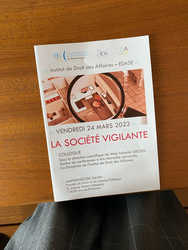The recent news

March 25, 2023
Publications

🌐 follow Marie-Anne Frison-Roche on LinkedIn
🌐subscribe to the Newsletter MAFR Regulation, Compliance, Law
🌐subscribe to the Video Newsletter MAFR Surplomb
____
 ► Full reference: M.A. Frison-Roche, Vigilance, a piece of the European puzzle, Working Paper, March 2023.
► Full reference: M.A. Frison-Roche, Vigilance, a piece of the European puzzle, Working Paper, March 2023.
____
🎤This Working Paper has been done as was made the conclusion of the colloquiul La société vigilante ("Vigilant Company") at the Aix-Marseille University on March 24, 2023 (conference given in French)
____
📝It is also the basis of the article that introduces a special issue on La société vigilante
____
► Summary of this Working Paper: The contributions form a contrasted whole. It should not be concluded that some of them are correct and others false: through the reading that each one makes of the so-called French 2017 "Vigilance law," it is a vision of the world as it should be that each author proposes. Because Compliance Law, which Vigilance is a part, claims to draw the future, it is normal that each author should draw the present Law with a hand that bends in one direction or the other, following their conception of the future world. The whole contributions must be seen as a dialogue.
A lively dialogue, with this French 2017 law receiving a lot of "glory" and a lot of "indignity" on both sides, from which it is necessary to emerge in order to find solutions, because it is a fundamental movement of which this law is only a gateway (I). Whatever one thinks of it, it is all the branches of law that are used, affected, and transformed by Vigilance (II). To master this profound transformation, we must turn to Europe, to the great puzzle of texts recently adopted or in the process of being adopted in the European Union, of which Vigilance is the hallmark (III).
____
🔓read the Working Paper⤵️
March 24, 2023
Conferences

♾️ follow Marie-Anne Frison-Roche on LinkedIn
♾️subscribe Newsletter MAFR Regulation, Compliance, Law
____
► Full Reference: M.-A. Frison-Roche, "Propos introductifs : Les buts monumentaux de la vigilance" (Introductory remarks: The Monumental Goals of Vigilance), in La société vigilante ("The Vigilant Company"), Aix-Marseille University, Institut de Droit des Affaires, March 24, 2023.
____
This conference is done in French; read its English Summary below⤵️
🧮see the complete program of the manifestation (in French)
____
► English Summary of the conference: "Vigilance" is intriguing because, although it occurs in many branches of Law and is familiar in "banking compliance", in a form that is moreover reinforced since it is an obligation of vigilance on the part of the banker about a client whom he/she should "know", it is the "duty of vigilance" that made this notion famous. One could almost say scandalously famous because of a French law of 2017 that now bears its name, called the "Vigilance Law", whereas other laws bear the name of the minister who thought of it, which due diligence (vocabulary used for the European directive) does not erase.
The current challenge is to take the right measure of what "vigilance" is.
Vigilance goes beyond the French Loi Vigilance, which is not enough to express what it is in its few dispositions. To say what it is in the legal system, to use it in practice, to propose the intellectuel legal exercice of qualification, Vigilance must be thought of in Compliance Law, of which it is both a "Tool" and the most advanced point, as shown by the European Directive, whose discussions during its elaboration show these design issues.
Thus, like the whole of Compliance Law, Vigilance is understood, deployed, analysed and exercised through what underpins and gives meaning to all these constantly changing regulations, powers, and obligations, through Compliance Monumental Goals which give it stability and simplicity. This is the least that can be done in a mechanism that has the ambition to organise the "sustainability" of economic relations.
But while Vigilance expresses and concretizes Compliance Monumental Goals, it must not go beyond measure.
In fact, to set up structures, use tools and behave in such a way that human rights and nature are effectively and extraterritorially protected, both negatively and positively, these obligations of the company, which is the natural subject of the "duty", more generally the natural subject of Compliance Law, see its legal powers increased, these means being required for the company to fulfil its new obligations, first legal, then contractual, soon to be unilaterally formulated.
Perhaps we should conceive of a "vigilant company" and not just a company that, beyond and through its economic activity, cares for others and the world, but a company that "watches over" everything and on everything would be to go beyond the measure, to make companies the "regents" of the world and the people who live in it.
Faced with this perspective to be excluded, the construction of a Europe of Compliance, which does not be reduced to corruption fighting or environment protection, and draws on its humanist tradition, distinguishing itself in this respect from the American and Chinese compliance systems, is the major challenge.
Companies are not the alpha and omega, but they are one of the elements of an Alliance between the political Authorities and the population, its link, the one that allows us to escape from the limit of the territory, in what we call by this inadequate term of "extraterritoriality". It is rather a question of going beyond territories, required by the Compliance Monumental Goals of Compliance, of which Vigilance is the advanced point.
____
🚧read the English Working Paper, basis of this conference: "Vigilance, Compliance Monumental Goals, and "Vigilant Company""
____
📈see the slides created for this conference (in French)
____
📝read the article published after this conference
________
March 24, 2023
Conferences

♾️ suivre Marie-Anne Frison-Roche sur LinkedIn
♾️s'abonner à la Newsletter MAFR Regulation, Compliance, Law
____
► Référence complète : M.-A. Frison-Roche, "synthèse", in I. Grossi (dir.), La société vigilante, Université d'Aix-Marseille, Institut de Droit des Affaires, 24 mars 2023.
____
____
🧮Consulter le programme complet de cette manifestation
____
Cette réflexion finale a servi de base à un article ; La vigilance, pièce du puzzle européen. Lire le document de travail sous-jacent.
____
► Présentation de la synthèse : La synthèse du colloque a été réalisée sur le vif, à partir des notes prises au fur et à mesure du déroulement de la journée. L'écoute des uns et des autres a fait ressortir 4 points qu'il aurait été difficile d'isoler dans une partie du droit positif, parce qu'il a été manifeste que les propos ont porté parfois sur la Compliance, parfois sure l'obligation de vigilance, parfois sur le devoir de vigilance et le plus souvent sur la loi du 27 mars 2017, laquelle a donc servi de porte d'entrée à l'ensemble des réflexions. Mais elle n'a été qu'une porte d'entrée.
Le premier point est justement l'impression d'une ampleur de tantôt de "gloire" et tantôt d'"indignité" qui ont été déversées sur cette loi Vigilance. Les intervenants ont donc fortement divergé.
Le deuxième point est l'impression à l'inverse générale et commune, pour que les orateurs s'en félicitent, s'en inquiètent, s'en réjouissent ou s'en effondrent, d'un grand mouvement auquel nous assistons et que la Vigilance traduit ou/et porte.
Le troisième point est la multiplicité des branches du Droit qui sont utilisées ou touchées, là encore qu'on s'en réjouisse ou pas, et la nécessité de dépasser ces branches du Droit. Face à la Vigilance, des disciplines peuvent apparaître en opposition, tandis que des branches du Droit semblent entrer comme en résistance. La majorité des intervenants ont souligné que les branches du Droit, cette loi n'étant alors que l'expression d'un mouvement plus vaste, la Vigilance dépassant la Loi Vigilance, sont activées et transformées. Il en est ainsi du Droit international et du Droit processuel. L'idée étant que la Vigilance pourrait bien être l'expression d'une branche du Droit spécifique et nouvelle : le Droit de la compliance. Au-delà de la compréhension de ce qui se passe, l'enjeu technique est d'articuler les branches du Droit concernées, notamment dans le rapport entre dispositions spéciales et principes, entre Droit spécial et Droit commun.
Le quatrième point est l'absence de définition de la vigilance. L'on en a peu davantage entendu de ce que pourrait être une "entreprise vigilante"...L'existence d'un devoir portant sur une situation précise suffit-elle à transformer toute l'entreprise et que devient-elle alors dans son entier ? Art pratique, le Droit n'aime pas les mystères. Car comment bien manier un instrument juridique dont la définition varie, dont on ne connaît que le régime, lequel varie au gré des réglementations, diverses et changeantes, ? Peut-elle varier selon les secteurs, selon les entreprises, selon les divers contrats qui sont partout ?
Peut-être, en conclusion et comme cela fût évoqué par certains, au-delà de la directive attendue sur la Corporate Sustainability Due Diligence, c'est plus largement dans le puzzle des définitions que le Droit de l'Union européenne est en train de construire, en corrélation avec le reporting extra-financier, que l'on pourra trouver, dans la conception systémique et humaniste portant l'identité européenne, voire sa souveraineté, ce qui donne sens et simplicité à la Vigilance.
____
✏️lire les notes prises sur le vif pour opérer la synthèse
____
📝lire l'article publié suite à cette conférence
________

March 23, 2023
Publications

♾️ follow Marie-Anne Frison-Roche on LinkedIn
♾️ subscribe to the Newsletter MAFR Regulation, Compliance, Law
____
 ► Full reference: M.A. Frison-Roche, Thinking and using Vigilance through its Compliance Monumental Goals, Working Paper, March 2023.
► Full reference: M.A. Frison-Roche, Thinking and using Vigilance through its Compliance Monumental Goals, Working Paper, March 2023.
____
🎤 This Working Paper has been done as basis for the introduction of the colloquia La société vigilante ("Vigilant Company") at the Aix-Marseille University on March 24, 2023 (conference given in French)
____
📝It is also the basis of the article that introduces a special issue on La société vigilante
____
► Summary of the Working Paper: The concept of "Vigilance" is difficult to define. Probably because even as it is becoming a standard, it has just entered the legal systems. And what a splash it is! To understand it, it must not be isolated. Neither in the only French law attracting all the attention, all the fears, all the hopes, the so-called Loi Vigilance ("Vigilance Law"), nor in the only technical mechanisms that make Vigilance a reality.
Vigilance is itself only a part of a deeper movement, of which it is the advanced point, allowing us to anticipate the evolution of the whole: Compliance Law.
In this light and for not getting lost in it, because the stakes are so high that one quickly loses the measure of things, with each party lashing out at the others, so Vigilance, the key element of Compliance, requires above all alliances, that we can first examine the entry of Vigilance into the legal system and then understand it through the Monumental Goals which give the measure of it, i.e. both the scope and the limit, each one having to act within the margins that are theirs, States, companies, stakeholders, and judges.
A Will for tomorrow can then emerge today, carried by Europe.
____
🔓read the Working Paper⤵️

March 20, 2023
Publications

♾️ follow Marie-Anne Frison-Roche on LinkedIn
♾️ subscribe to the Newsletter MAFR Regulation, Compliance, Law
____
► Full Reference: M.-A. Frison-Roche, Laws, Compliance, Contracts, and Judges: places and alliances, Working Paper, March 2023.
____.
📝this working paper is the basis for an article published in French (click HERE) in the 📚chronique of Compliance Law held in the Recueil Dalloz.
____
📚Read the other articles published by this Compliance Law Chronicle. open since 2018.
____
►Summary of this Working Paper: To understand the functioning of compliance systems in the articulation of the legal actors and the legal instruments used, whatever the technical sector considered, it is necessary to put the "law", the "contract" and the "judge" back into the perspective of legitimacy and efficiency regarding what Compliance is.
At the very least, it is a 'conformity' mechanism. In this process of simple obedience, legislators, economic operators, and judges find themselves in the position of having to obey the law in a hierarchical conception.
In a more dynamic and ambitious conception, when Compliance Law is not reduced to a more astute method of obedience but draws substantial normativity from the Monumental Goals pursued, legislators and operators enter an alliance. The contract becomes a major instrument, and the Judge becomes a major actor, no longer to punish the non-obedient but to facilitate the links to help a sustainable system.
Faced with issues such as digital, climatic, and technological challenges, where we are each so weak and isolated, we must not limit our conception and practices to the instrument of conformity but choose the substantial Compliance Law, i.e. the alliance of forces, which puts forward the contract and renews the office of the judge, with the Public Authorities remaining legitimate in setting the Monumental Goals since they commit the future of the social group.
________
🔓read bellow the developments⤵️
Updated: March 15, 2023 (Initial publication: May 18, 2021)
Publications

► Full Reference: M.-A. Frison-Roche, "Place and rôle of Companies in the Creation and Effectiveness of Compliance Law in situation of crisis", in M.-A. Frison-Roche (ed.), Compliance Monumental Goals, series "Compliance & Regulation", Journal of Regulation & Compliance (JoRC) and Bruylant, 2023, p.
____
► Article Summary: This article has a very topic: the place of private Companies, regarding the chapter's issue: "the ordeal of a crisis". The crisis constitutes a "test", that is to say, it brings evidence. Let us take it as such.
Indeed, during the health crisis, Companies have helped the Public Authorities to resist the shock, to endure and to get out of the Crisis. They did so by force, but they also took initiatives in this direction. From this too, we must learn lessons for the next crisis that will come. It is possible that this has already started in the form of another global and systemic crisis: the environmental crisis. In view of what we have been able to observe and the evolution of the Law, of the standards adopted by the Authorities but also by the new case law, what can we expect from Companies in the face of this next Crisis, willingly and strength?
____
🚧Read the bilingual Working Paper, with more developments, technical references, and hypertext links.
____
____
► read the presentations of the other Marie-Anne Frison-Roche's contributions in this book:
📝Compliance Monumental Goals, beating heart of Compliance Law,
📝Definition of Principe of Proportionality and Definition of Compliance Law,
📝 Assessment of Whistleblowing and the duty of Vigilance
________
.
March 15, 2023
Publications

♾️ follow Marie-Anne Frison-Roche on LinkedIn
♾️ subscribe to the Newsletter MAFR Regulation, Compliance, Law
____
► Full Reference: M.-A. Frison-Roche, "Compliance Monumental Goals, beating heart of Compliance Law", in M.A. Frison-Roche (ed.), Compliance Monumental Goals, series "Compliance & Regulation", Journal of Regulation & Compliance (JoRC) and Bruylant, 2023, p.
___
► Article Summary: Compliance Law can be defined as the set of processes requiring companies to show that they comply with all the regulations that apply to them. It is also possible to define this branch of Law by a normative heart: the "Monumental Goals". These explain the technical new legal solutions, thus made them clearer, accessible and anticipable. This definition is also based on a bet, that of caring for others that human beings can have in common, a form of universality.
Through the Monumental Goals, appears a definition of Compliance Law that is new, original, and specific. This new term "Compliance", even in non-English vocabulary, in fact designates a new ambition: that a systemic catastrophe shall not be repeated in the future. This Monumental Goal was designed by History, which gives it a different dimension in the United States and in Europe. But the heart is common in the West, because it is always about detecting and preventing what could produce a future systemic catastrophe, which falls under "negative monumental goals", even to act so that the future is positively different ("positive monumental goals"), the whole being articulated in the notion of "concern for others", the Monumental Goals thus unifying Compliance Law.
In this, they reveal and reinforce the always systemic nature of Compliance Law, as management of systemic risks and extension of Regulation Law, outside of any sector, which makes solutions available for non-sector spaces, in particular digital space. Because wanting to prevent the future (preventing evil from happening; making good happen) is by nature political, Compliance Law by nature concretizes ambitions of a political nature, in particular in its positive monumental goals, notably effective equality between human beings, including geographically distant or future human beings.
The practical consequences of this definition of Compliance Law by Monumental Goals are immense. A contrario, this makes it possible to avoid the excesses of a "conformity law" aimed at the effectiveness of all applicable regulations, an extremely dangerous perspective. This makes it possible to select effective Compliance Tools regarding these goals, to grasp the spirit of the material without being locked into its flow of letters. This leads to not dissociating the power required of companies and the permanent supervision that the public authorities must exercise over them.
We can therefore expect a lot from such a definition of Compliance Law by its Monumental Goals. It engenders an alliance between the Political Power, legitimate to enact the Monumental Goals, and the crucial operators, in a position to concretize them and appointed because they are able to do so. It makes it possible to find global legal solutions for global systemic difficulties that are a priori insurmountable, particularly in climate matters and for the effective protection of people in the now digital world in which we live. It expresses values that can unite human beings.
In this, Compliance Law built on Monumental Goals is also a bet. Even if the requirement of "conformity" is articulated with this present conception of what Compliance Law is, this conception based on Monumental Law is based on the human ability to be free, while conformity law supposes more the human ability to obey.
Therefore, Compliance Law, defined by the Monumental Goals, is essential for our future, while conformity law is not.
____
🚧 read the bilingual Working Papier, with more technical developments, references, and links
____
📘read a general presentation of the book, Compliance Monumental Goal, in which this article is published.
________
► read the presentations of the other Marie-Anne Frison-Roche's contributions in this book:
📝Definition of Principe of Proportionality and Definition of Compliance Law,
📝 Role and Place of Companies in the Creation and Effectiveness of Compliance Law in Crisis,
Updated: March 15, 2023 (Initial publication: Oct. 14, 2021)
Publications

► Full Reference: M.-A. Frison-Roche, " Definition of Proportionality and Definition of Compliance Law", in M.-A. Frison-Roche (ed.), Compliance Monumental Goals, series "Compliance & Regulation", Journal of Regulation & Compliance (JoRC) and Bruylant, 2023, p.
___
► Article Summary: The use of Proportionality t always limit powers is only justified when it is about sanctions, but sanctions are only one tool among others in Compliance Law, intended moreover to have little place in this Ex Ante branch of Law. And returning to the very nature of Compliance Law, which relies on operators, private or public, because they are powerful, then using proportionality to limite powers is detrimental to Compliance Law.
However, nothing requires that. Compliance Law is not an exception that should be limited. On the contrary, it is a branch of Law which carries the greatest principles, aimed at protecting human beings and whose Normativity lies in its "Monumental Goals": detecting and preventing future major systemic crisis (financial, health and climate ones).
However, literally the principle of Proportionality is: "no more powers than necessary, as many powers as necessary".
The second part of the sentence is independent of the first: this must be used.
Politics having fixed these Monumental Goals, the entity, in particular the company, must have, even tacitly, "all the necessary powers" to achieve them. For example, the power of vigilance, the power of audit, the power over third parties. Because they are necessary to fulfill the obligations that these "crucial operators" must perform as they are "in a position" to do so.
So instead of limiting the powers, the Principe of Proportionality comes to support the powers, to legitimize them and to increase them, so that we have a chance that our future is not catastrophic, perhaps better.
In this respect, Compliance Law, in its rich Definition, will itself have enriched the Principle of Proportionality.
____
🚧read the Working Paper, with technical developments, references, and hypertext links.
____
📘go to the general presentation of the book in which this article is published
____
► read the presentations of the other Marie-Anne Frison-Roche's contributions in this book:
📝Compliance Monumental Goals, beating heart of Compliance Law,
📝 Role and Place of Companies in the Creation and Effectiveness of Compliance Law in Crisis,
📝 Assessment of Whistleblowing and the duty of Vigilance
________